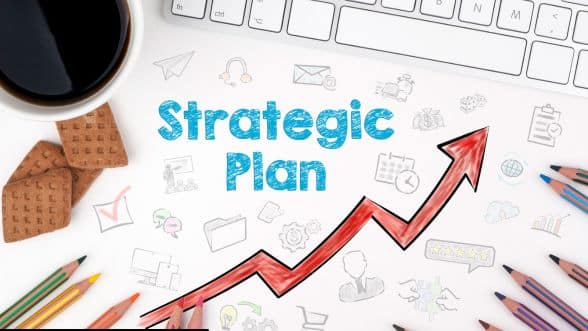
Strategic planning is a critical skill for mid-career leaders aiming to advance their careers and drive organizational success. As leaders progress in their careers, the ability to foresee potential challenges, set clear objectives, and develop actionable plans becomes increasingly vital. This article explores the importance of strategic planning for mid-career leaders, highlighting how this skill can foster growth, enhance decision-making, and ensure long-term success.
The Role of Strategic Planning in Leadership
Anticipating Challenges and Opportunities
Mid-career leaders often find themselves at a crossroads where they must navigate complex organizational dynamics and anticipate future challenges. Strategic planning enables leaders to proactively identify potential obstacles and opportunities, allowing them to devise contingency plans and seize growth prospects effectively.
Setting Clear Objectives
Strategic planning involves setting clear, measurable objectives that align with both personal career goals and organizational missions. Mid-career leaders who excel in strategic planning can articulate their vision and create a roadmap that guides their teams towards achieving these objectives, fostering a sense of purpose and direction.
Enhancing Decision-Making
Effective strategic planning equips leaders with the tools to make informed decisions. By analyzing data, forecasting trends, and evaluating risks, mid-career leaders can make decisions that are not only reactive but also proactive, ensuring their actions align with long-term goals.
Benefits of Strategic Planning for Mid-Career Leaders
Career Advancement
Strategic planning is a key differentiator for leaders looking to advance their careers. It demonstrates a leader’s ability to think critically, manage resources efficiently, and drive organizational success. Leaders who master strategic planning are often seen as valuable assets, positioning themselves for promotions and new opportunities.
Team Empowerment
A well-thought-out strategic plan provides clear guidance and expectations for team members. Mid-career leaders can use strategic planning to empower their teams, ensuring everyone understands their roles and how their contributions align with the broader organizational goals. This not only enhances team cohesion but also boosts morale and productivity.
Long-Term Success
By focusing on long-term goals and creating sustainable strategies, mid-career leaders can ensure the enduring success of their teams and organizations. Strategic planning helps leaders balance short-term demands with long-term objectives, fostering resilience and adaptability in a rapidly changing business environment.
Developing Strategic Planning Skills
Continuous Learning
Mid-career leaders should commit to continuous learning to refine their strategic planning skills. This can involve attending workshops, enrolling in executive education programs, or seeking mentorship from seasoned leaders. Learning about new strategic frameworks and methodologies can provide fresh perspectives and innovative approaches to planning.
Leveraging Executive Function Coaching
Executive function coaching can be instrumental in enhancing strategic planning skills. Coaches can help leaders improve their organization, time management, and decision-making abilities. By focusing on executive functions, leaders can develop the cognitive flexibility needed to adapt their strategic plans to evolving circumstances.
Practical Application
The best way to develop strategic planning skills is through practical application. Mid-career leaders should actively seek opportunities to apply their strategic planning skills in real-world scenarios. This could involve leading strategic initiatives, participating in cross-functional projects, or taking on roles that require long-term planning and execution.
Types of Continuing Education for Strategic Planning Skills
Executive Education Programs
Top business schools and universities offer executive education programs specifically designed to enhance strategic planning and leadership skills. Look for programs that focus on strategic management, leadership development, and business strategy.
Workshops and Seminars
Workshops and seminars on strategic planning, decision-making, and leadership are excellent ways to gain hands-on experience and insights from experts. Topics to look for include strategic thinking, scenario planning, and risk management.
Professional Certifications
Consider obtaining professional certifications that emphasize strategic planning and management. Certifications like Project Management Professional (PMP), Certified Management Consultant (CMC), and Certified Business Strategist (CBS) are highly regarded.
Online Courses and Webinars
Platforms like Coursera, LinkedIn Learning, and Harvard Business School Online offer courses on strategic planning and related topics. Search for keywords such as “strategic management,” “business strategy,” “leadership development,” and “executive decision-making.”
Mentorship and Coaching
Engage with mentors and coaches who specialize in executive leadership and strategic planning. Personalized guidance can provide valuable feedback and help you refine your strategic planning skills.
Industry Conferences
Attend industry conferences and networking events that focus on strategic planning and leadership. These events offer opportunities to learn from industry leaders, stay updated on trends, and expand your professional network.
Strategic planning is an essential skill for mid-career leaders aiming to achieve personal and organizational success. By anticipating challenges, setting clear objectives, and enhancing decision-making, leaders can drive sustainable growth and foster a culture of innovation. Through continuous learning, leveraging executive function coaching, and practical application, mid-career leaders can refine their strategic planning abilities and pave the way for future achievements.




